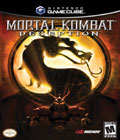Genre : Action/Fighting
Publisher: Midway
Developer: Midway
Release Date: Q4 2004
Pre-order 'MORTAL KOMBAT: Deception': Xbox | PlayStation 2
I remember when Mortal Kombat games were jokes. They were bloody, and fun in a sort of sophomoric way, but they weren’t as deep or popular as what most saw as their natural competition, the Street Fighter series. MK peaked with MKII, then hit the skids with MKIII, and has spent the last few games picking itself back up out of that crater.
Deadly Alliance was easy to break, but fun while it lasted, with an oddly addictive gameplay system that revolved around switching into and out of martial-arts styles, a surprising number of unlockables and some truly lame Fatalities. If it hadn’t been for the returning cast, and those Fatalities, it would’ve been hard to think of Deadly Alliance as a Mortal Kombat game at all.
Now, Mortal Kombat: Deception has come along, and it’s a further improvement upon Deadly Alliance’s formula. Its setting is, once again, the Outworld, the alternate dimension that has served as the staging ground for most of the previous MKs, and it apparently takes place a very short time after the events of the first game.
Returning from Deadly Alliance are Scorpion, Sub-Zero, Li Mei, Kenshi, and Bo Rai Cho, with Jax revealed as one of the twelve characters who can be unlocked over the course of play. The rest of the cast is comprised of new fighters, such as the white-clad kung-fu fighter Ashrah, and several old MK contestants making their 3D debut. I don’t think anyone thought that we’d ever see Nightwolf, Sindel, or Ermac come back to MK, but the return of Baraka and Mileena from MKII seems oddly right somehow. After all, they were using weapons in MK before it was cool.
The game plays much like Deadly Alliance, with extra background interaction and an extra layer of polish to the graphics. Deadly Alliance had that weird twitchy, shiny look to its polygon models, but that’s gone in Deception. It’s not the hyperdetailed model you’d expect from, say, Namco, but characters still look and move remarkably well. Blood accumulates across the floor as you fight; bruises form on a pummeled character’s face; and the backgrounds have been taken to a new level.
Over the course of a round of kombat, you and your opponent may go from one part of the surprisingly large stages to another, as you smash each other through railings, over ledges, or into obstacles. Punch someone into a window, and it’ll break; knock them into a corpse swinging from a rope, and it’ll swing back in your direction. The infamous stage fatalities from the game’s early trailers – a red-hot metal press on the bottom floor of a foundry; a very, very long fall from the top of a crumbling platform, ending against a blunt spike – are now something not unlike “ring outs” in Soul Calibur or Virtua Fighter, where the victim’s gory demise ends the round in the survivor’s favor, but doesn’t necessarily end the fight. The dead guy just, you know, pulls himself back together, pops a Motrin, and gets back into the fray. I mean, it’s just a slight case of complete dismemberment. Why be a baby about it?
Just as before, each character comes preequipped with two martial-arts styles and a weapon, which can be changed with the press of a button, as well as two to four special moves, that they have access to regardless of whatever style they’re in. Your offensive and defensive options depend largely on using those styles in conjunction with your special moves, as in Deadly Alliance, although it seems harder to put together long combos in this system.
Fatalities are back, and they’re reportedly gorier than ever, with each character having access to two of them. Unfortunately, unless you had the luck to run into Ed Boon on the E3 show floor, you didn’t get to see anything that wasn’t in the trailer. One Fatality, talked about but not shown, was Sub-Zero’s new take on his old spine-ripping finishing move, where he doesn’t simply tear off his opponent’s head, with its spine still attached, but uses it to shatter his deceased opponent’s frozen corpse.
Deception has the same feel to it that Deadly Alliance did, where it takes the Mortal Kombat series to the next level without feeling like a wild departure from its roots. The sound effects are comfortably similar, with the old painful-sounding crunches and over-the-top grunts in full effect, and there’s still someone providing the series’ trademark bellowed bass round announcements. With buckets of gore thrown over a unique and interesting combat engine, Deception continues the reinvention of Mortal Kombat. The Xbox version will have Live functionality thrown into the mix, which brings it about as close to the arcade as the game will probably get.
There are a lot of extras to go with it, too. Puzzle Kombat is a simple minigame that… well, frankly, it rips off Super Puzzle Fighter II Turbo about as thoroughly as you can imagine. The chess minigame resembles Archon, with a chessboard of fighters battling each other when one player tries to capture another’s piece. Finally, there’s the single-player Konquest mode, which is an exploratory adventure game featuring a new fighter, who over the course of his training, meets many of the old MK cast.
With twenty-four characters to master, two minigames, and a full-blown adventure game waiting inside, Mortal Kombat: Deception is sounding better with every bit of news that’s released. If you didn’t like Deadly Alliance, this isn’t going to change your mind, but Deception still has a lot to recommend it.
More articles about Mortal Kombat: Deception







































